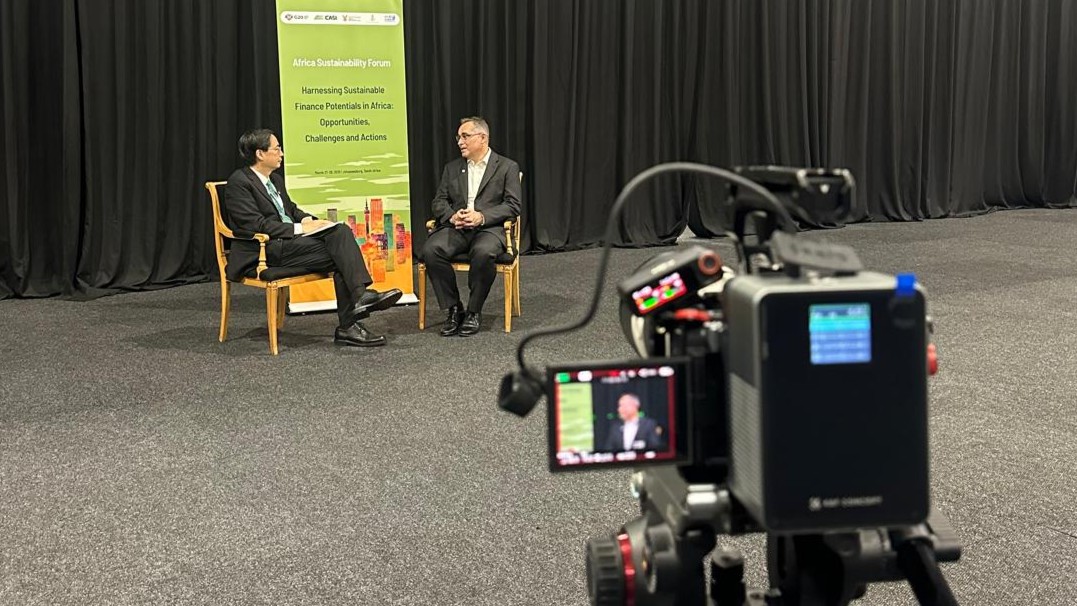
At the recent CASI Forum on African Sustainability, Dr. Ma Jun and Mr. Lawrence Cole-Morgan, an Executive in the Global Markets Division at Standard Bank, discussed the evolving role of Voluntary Carbon Markets (VCMs) in accelerating sustainable development—particularly in emerging and developing economies.
Drawing on their extensive experience in climate finance and policy, the conversation explored key focus areas, including market interoperability, cross-border investment, technological innovation, local capacity building, and the role of governments in enabling carbon markets.
Strengthening Market Interoperability
One of the central themes was the opportunity to enhance interoperability across voluntary carbon markets. Dr. Ma highlighted the rapid growth of VCMs—at least 37 globally, according to Lawrence—which reflects strong international momentum. However, many of these markets are still in their early stages and developing in isolation, leading to misalignment with best practices, inefficiency, and lack of liquidity.
Inconsistent standards, in particular, create uncertainty and hinder investor confidence. Lawrence emphasized the need for a shared understanding of what constitutes a “high-quality” credit. Currently, variations in standards across VCMs result in inconsistent pricing and investor perceptions.
The Core Carbon Principles (CCPs), developed by the Integrity Council for the Voluntary Carbon Market (ICVCM), aim to provide a credible and consistent benchmark. Dr. Ma, former CO-Chair of the G20 Sustainable Finance Working Group and a former ICVCM board member, highlighted the need for global efforts to promote CCP adoption - especially from platforms like the G20 which could help position the ICVCM framework as a global benchmark for VCM standards.
They also discussed the potential for alignment between ICVCM’s work and Article 6.4 of the Paris Agreement, which is designed to establish a UN-backed international carbon market. While the two efforts are currently separate, Lawrence suggested that future integration could enhance trust and harmonization across the global carbon market ecosystem.
Encouraging Cross-Border Investment Through Article 6
The conversation also addressed how Article 6 mechanisms can promote cross-border investment. Dr. Ma pointed out that several bilateral agreements—such as those between Singapore and certain African nations—are already underway, but these are just early examples.
Lawrence noted that many developing countries are still building the infrastructure needed to participate in international markets. This includes emissions tracking systems, sector identification, and national registries. Though these are complex undertakings, they represent significant opportunities for innovation and investment.
Ghana was highlighted as a success story. The country has made notable progress in structuring its carbon market and has attracted substantial foreign investment. Lawrence expressed optimism that this kind of leadership will serve as a model for others in the region.
Leveraging Technology for Transparency and Efficiency
Another important focus was the role of technology in enabling more transparent, efficient, and cost-effective VCMs. Dr. Ma stressed the need to ensure that carbon credit revenues benefit local communities rather than being absorbed by administrative and consultancy costs.
Lawrence identified technologies such as blockchain, satellite monitoring, and digital verification as powerful tools for improving traceability and reducing overhead. These innovations can help ensure that funds are directed toward real, measurable climate benefits on the ground.
Building Local Capacity and Regional Leadership
Africa's current lack of local verification infrastructure was acknowledged as both a challenge and an opportunity. Lawrence emphasized the importance of developing Africa-specific standards and training programs to empower local verifiers, reduce transaction costs, and build regional leadership in carbon markets.
He noted that local capacity building is essential for long-term sustainability and equity in carbon credit systems. It also enables more inclusive participation from communities that often bear the greatest burden of climate change.
The Role of Governments and Institutions
To conclude the discussion, Dr. Ma invited suggestions on how platforms like CASI could support the advancement of carbon market expertise. In response, Lawrence highlighted the pivotal role of governments in laying the foundation for successful market development.
He suggested that CASI could add significant value by assisting governments in developing clear, transparent, and investment-friendly regulatory frameworks. In today’s emerging buyer’s market - where only a few countries are actively purchasing carbon credits, streamlined and accessible regulations can help attract and retain investor interest.
Striking the right balance between environmental integrity and investor appeal, he added, is critical for the long-term success and credibility of voluntary carbon markets.
For full videos, please visit CASI’s YouTube Channel: https://youtu.be/a1p0oAoJ2NM

